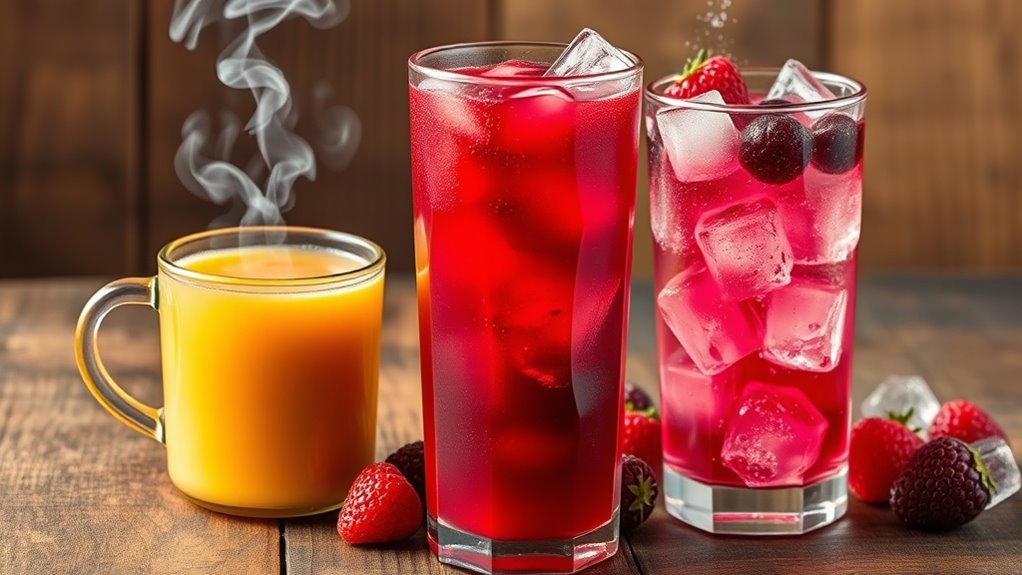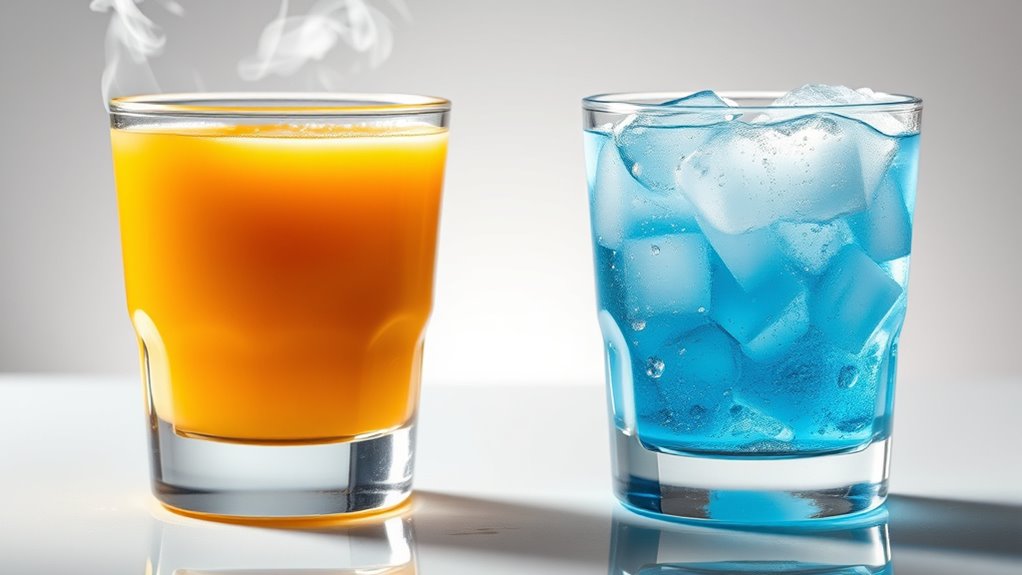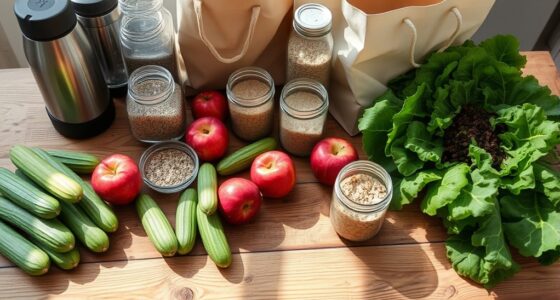Choosing between warm and cold juices impacts your comfort and digestion. Warm juice enhances sweetness, soothes your stomach, and feels more nourishing, especially in colder weather. Cold juice refreshes and cools, helping you hydrate quickly and feel more invigorated. Warm drinks relax your digestive muscles, while cold can slow digestion slightly. Understanding these effects helps you pick the best option for your needs, and exploring further reveals how temperature influences your overall experience.
Key Takeaways
- Warm juice enhances natural flavors and aroma, making it more comforting and flavorful.
- Warm temperature relaxes gastrointestinal muscles, aiding smoother digestion and reducing bloating.
- Cold juice can slow digestion due to blood vessel constriction, potentially causing discomfort.
- Warm juice offers soothing relief for sore throats and digestive issues.
- Cold juice provides quick hydration and a refreshing sensation, ideal for hot days or post-exercise.

Have you ever wondered whether warm or cold juices are better for your health and taste buds? The answer depends largely on how temperature influences flavor enhancement and your digestion. When you choose warm juice, you’re likely to notice a different flavor profile compared to cold juice. Warm temperatures tend to amplify certain taste notes, especially sweetness and aroma, making the juice seem richer and more comforting. This is because heat can release volatile compounds in fruits, intensifying their natural flavors. Conversely, cold juice often offers a crisper, more invigorating taste, which can mask some subtler flavors but provide a satisfying chill on hot days. The temperature effects on flavor are subtle but significant, shaping your overall sensory experience.
Warm juice enhances sweetness and aroma, creating a richer, more comforting flavor profile.
Warm juice also impacts your digestion differently. When you consume it warm, your digestive system may find it easier to process. Warm liquids tend to relax your gastrointestinal muscles, promoting smoother digestion and potentially reducing bloating or discomfort. This effect is especially beneficial if you’re dealing with digestion issues or simply want a soothing beverage after a meal. Cold juice, on the other hand, can slow down digestion slightly because cold constricts blood vessels and tightens muscles. While this isn’t usually a problem for healthy digestion, it can be less gentle on your stomach if consumed in excess or on an empty stomach. Additionally, some studies suggest that temperature-sensitive enzymes in fruits may function more effectively at certain temperatures, influencing nutrient absorption.
Another factor to contemplate is how your body responds to temperature. Warm juice can feel more nourishing and comforting, especially during colder months or when you’re feeling under the weather. It helps warm your core and can even soothe sore throats. On the flip side, cold juice offers a quick hydration boost and can help cool you down on hot days or after intense activity. The temperature effects on hydration are notable; cold liquids are often perceived as more thirst-quenching because they provide a cooling sensation, which can encourage you to drink more.
Ultimately, your preference for warm or cold juice hinges on your personal taste and comfort needs. If you prioritize flavor enhancement and gentle digestion, warm juice might be your best bet. But if you’re after refreshment and a quick cooling effect, cold juice is likely more appealing. Both have their unique benefits, and understanding the temperature effects on flavor and digestion helps you make smarter choices. Whether you prefer the cozy comfort of warm juice or the invigorating chill of cold, knowing how temperature influences your experience allows you to enjoy your juice in a way that best suits your mood and health needs.
Frequently Asked Questions
How Does Temperature Affect Juice Nutrient Preservation?
You’ll find that temperature influences juice nutrient preservation by affecting nutrient degradation and oxidation effects. Cold juices slow down enzyme activity and oxidation, keeping nutrients intact longer, whereas warm juices accelerate these processes, leading to faster nutrient loss. To maximize nutrient preservation, it’s best to serve and store juice cold, reducing oxidation effects and keeping vitamins and minerals more potent. This way, you enjoy healthier, more nutritious juice with every sip.
Can Warm Juices Help With Specific Digestive Issues?
Warm juices can promote digestive comfort by soothing your stomach and helping enzyme activation. The warmth may relax your digestive muscles, reducing bloating and discomfort. If you struggle with indigestion or sluggish digestion, drinking warm juice might ease symptoms and support enzyme function, aiding better nutrient absorption. Just make certain the juice isn’t too hot, as excessive heat can kill beneficial enzymes and diminish nutrient quality.
Are There Juices Best Suited for Cold Consumption?
Yes, some juices are best suited for cold consumption, especially those with delicate flavors like berry or citrus blends. Chilled juices preserve their invigorating qualities and enhance flavor pairing, making them more enjoyable. You’ll find that cooling these juices can boost flavor enhancement and keep their natural freshness intact. For a delightful experience, serve fruit pairings cold, so you enjoy the vibrant, crisp taste that complements their natural sweetness.
How Does Juice Temperature Influence Hydration Levels?
Imagine your thirst as a dry desert; cold juice acts like a revitalizing oasis, instantly hydrating and enhancing flavor through crisp, invigorating sensations. When you drink cold juice, your sensory experience is heightened, making hydration feel more satisfying. Cold temperatures help your body absorb fluids faster, boosting hydration levels. So, drinking cold juice not only quenches your thirst quickly but also amplifies the flavor and invigorates your senses.
Is There a Recommended Temperature for Juice Consumption After Workouts?
For post-workout recovery, you should prefer chilled juice, as cold temperatures help replenish fluids faster and soothe your muscles. Keep your juice stored in airtight containers in the fridge to maintain freshness and ideal temperature preferences. Cold juice is also more invigorating after exercise, encouraging you to hydrate more effectively. If you prefer, warm juice can be comforting, but cold is generally recommended for quick rehydration and recovery.
Conclusion
Choosing between warm and cold juices ultimately depends on what your body needs and your personal preference. Warm juices can soothe digestion and provide comfort, while cold juices refresh and invigorate. Isn’t it worth listening to your body’s signals to decide which feels right in the moment? Whether you prefer warmth or chill, trust that tuning into your body’s response can help you enjoy your juice in the most nourishing way. After all, your comfort and health come first.
Cindy thoroughly researches juicing trends, techniques, and recipes to provide readers with practical advice and inspiration. Her writing style is accessible, engaging, and designed to make complex concepts easy to understand. Cindy’s dedication to promoting the advantages of juicing shines through her work, empowering readers to make positive changes in their lives through the simple act of juicing.











